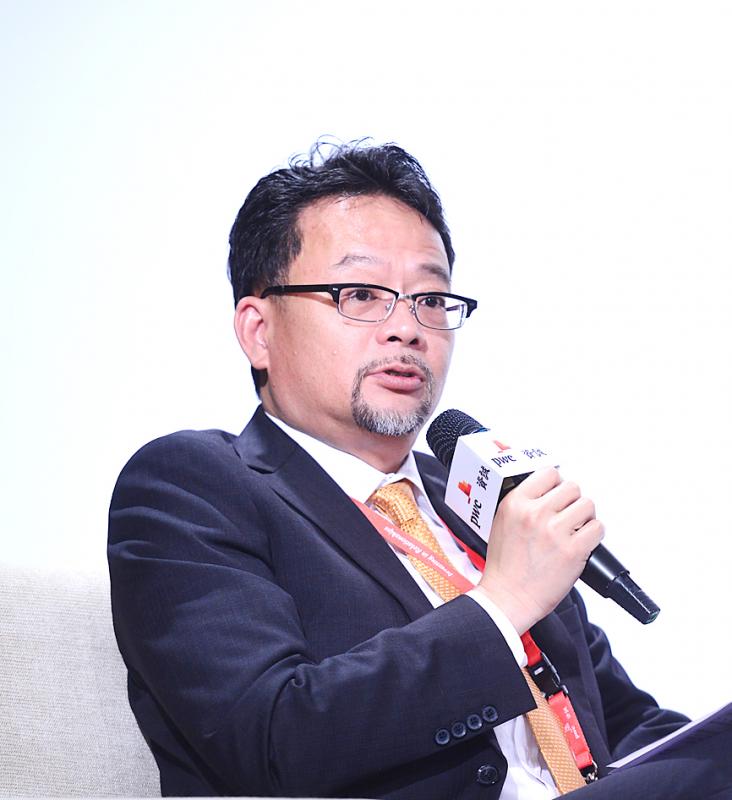Working from home is likely to become a regular arrangement even though the world is increasingly emerging from the COVID-19 pandemic, PricewaterhouseCoopers (PwC) Taiwan yesterday told a forum in Taipei.
PwC’s US arm has introduced a permanent remote working model for its 40,000 employees, who need to travel to the office three days per month or less, for key meetings or training courses, PwC Taiwan human resources head Alan Lin (林瓊瀛) said.
The accounting firm would adjust wages and perks for employees who move to locations with lower living costs, Lin said.

Photo courtesy of PwC Taiwan
PwC Taiwan would keep its offices unchanged for now, but it would seek to make better use of them in the future, he added.
Taiwanese workers mainly focus on monetary compensation, being able to be themselves at work, and being physically and psychologically cared for, Lin said, adding that 70 percent of them favor hybrid arrangements in which they can work from home on some days of the week.
Companies should seek to meet those expectations by providing fair monetary compensations and fulfilling work environments to recruit and retain talent, he said.
Globally, 54 percent of workers think their job can be done remotely, and 41 percent of Taiwanese workers share this view, PwC Taiwan said, citing a survey.
Lin said higher wages can help retain talent, but overreliance on pay increases might contribute to inflation, as companies would have to pass higher personnel costs to customers.
Companies should instead pay attention to workers’ needs, as global data showed that they are willing to spend 20 to 25 percent of their income on improving their work-life balance, he said.

South Korea’s equity benchmark yesterday crossed a new milestone just a month after surpassing the once-unthinkable 5,000 mark as surging global memory demand powers the country’s biggest chipmakers. The KOSPI advanced as much as 2.6 percent to a record 6,123, with Samsung Electronics Co and SK Hynix Inc each gaining more than 2 percent. With the benchmark now up 45 percent this year, South Korea’s stock market capitalization has also moved past France’s, following last month’s overtaking of Germany’s. Long overlooked by foreign funds, despite being undervalued, South Korean stocks have now emerged as clear winners in the global market. The so-called “artificial intelligence

‘SEISMIC SHIFT’: The researcher forecast there would be about 1.1 billion mobile shipments this year, down from 1.26 billion the prior year and erasing years of gains The global smartphone market is expected to contract 12.9 percent this year due to the unprecedented memorychip shortage, marking “a crisis like no other,” researcher International Data Corp (IDC) said. The new forecast, a dramatic revision down from earlier estimates, gives the latest accounting of the ongoing memory crunch that is affecting every corner of the electronics industry. The demand for advanced memory to power artificial intelligence (AI) tasks has drained global supply until well into next year and jeopardizes the business model of many smartphone makers. IDC forecast about 1.1 billion mobile shipments this year, down from 1.26 billion the prior

People stand in a Pokemon store in Tokyo on Thursday. One of the world highest-grossing franchises is celebrated its 30th anniversary yesterday.

Chinese artificial intelligence (AI) start-up DeepSeek’s (深度求索) latest AI model, set to be released as soon as next week, was trained on Nvidia Corp’s most advanced AI chip, the Blackwell, a senior official of US President Donald Trump’s administration said on Monday, in what could represent a violation of US export controls. The US believes DeepSeek will remove the technical indicators that might reveal its use of American AI chips, the official said, adding that the Blackwells are likely clustered at its data center in Inner Mongolia, an autonomous region of China. The person declined to say how the US government received